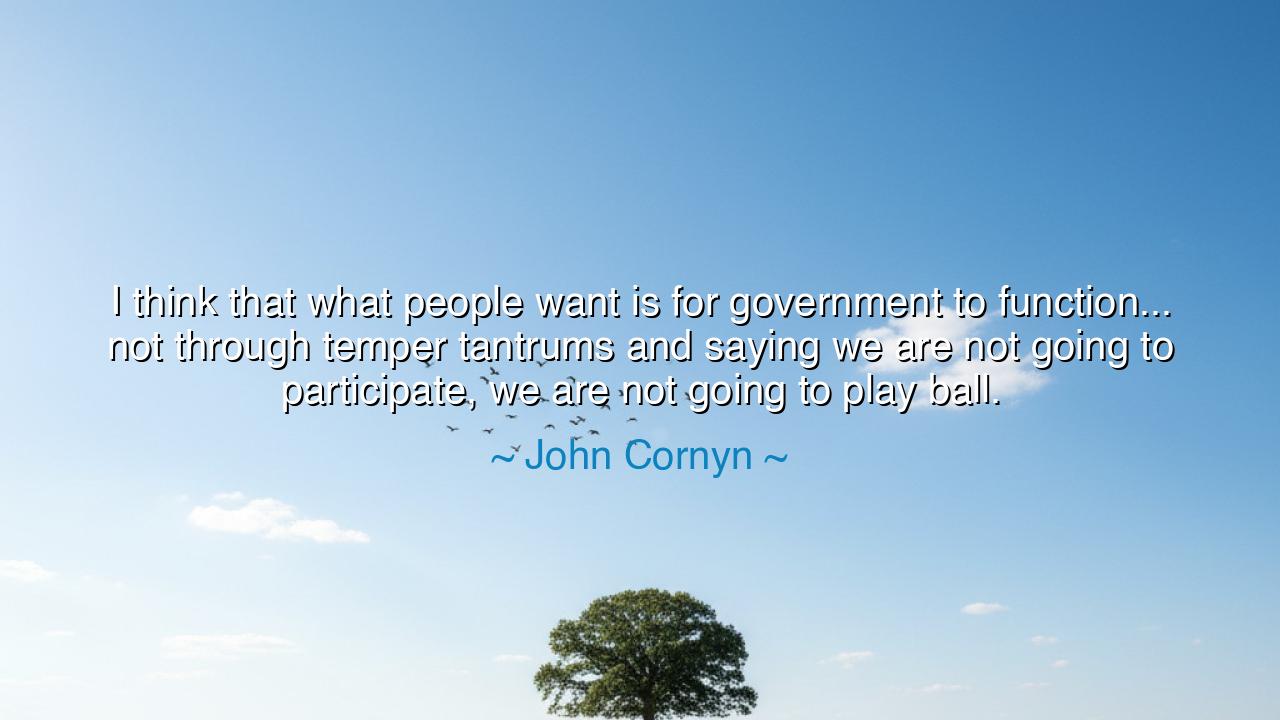
I think that what people want is for government to function...
I think that what people want is for government to function... not through temper tantrums and saying we are not going to participate, we are not going to play ball.






In the restless chambers of politics, where pride and passion often drown the voice of reason, John Cornyn — a senator and statesman — spoke words that ring with both humility and wisdom:
"I think that what people want is for government to function... not through temper tantrums and saying we are not going to participate, we are not going to play ball."
These words, though born in the clamor of modern governance, echo with an ancient truth: that leadership is not theater, and that governance is not a game for children quarreling in the courtyard of power. Cornyn’s statement is not a rebuke of passion, but of pettiness — a reminder that when those entrusted with authority trade cooperation for chaos, the people suffer. His words speak to the weariness of citizens who long not for spectacle, but for stability; not for vengeance, but for vision. In the heart of democracy, where many voices must find harmony, Cornyn calls for the forgotten virtue of participation — the willingness to engage even when compromise is difficult, and to serve even when pride demands retreat.
The meaning of his words reaches into the soul of public duty. The government, in its highest form, is a reflection of its people’s better nature — patient, just, and purposeful. But when it descends into tantrums and tribal warfare, it mirrors instead their worst instincts: the desire to dominate rather than to understand. Cornyn’s warning is thus not only for politicians but for all who live under the banner of freedom: a house divided against itself cannot govern. A nation is not preserved by anger, but by dialogue; not by obstinacy, but by cooperation. The machinery of state, like a great engine, must be oiled by civility and mutual respect, or else grind itself to ruin through the friction of arrogance.
The origin of Cornyn’s insight lies in the turbulence of American politics, an age when partisanship had grown sharp enough to wound the very ideals it claimed to protect. As debates turned to shouting matches and compromise became a mark of weakness, the art of governance began to erode. Cornyn, a figure steeped in both law and leadership, saw that the people did not crave victory for one side or another — they craved functionality. They wanted their roads built, their schools funded, their futures secure. They wished to see their leaders work, not war. His words were a plea for maturity, for a return to the sacred duty of serving the common good, even when unity seems out of reach.
History, too, offers its lessons on the cost of division. Consider the final years of the Roman Republic, when prideful senators, driven by ego and factionalism, refused to yield or listen. The people watched as once-great leaders — Pompey, Caesar, and Crassus — turned the Senate’s deliberations into vendettas. What should have been a government of law became a theater of vengeance. And so Rome, weary of chaos, traded liberty for order, freedom for empire. The Republic fell not because of invasion, but because its rulers chose conflict over cooperation, and ego over duty. Cornyn’s warning thus echoes the same eternal principle: that the decay of governance begins not in failure of law, but in failure of spirit.
But this teaching does not apply only to governments. It belongs to every human circle where cooperation is required — families, communities, nations alike. When pride replaces patience, when anger silences dialogue, even the smallest household begins to fracture. Temper tantrums, as Cornyn calls them, are the symptoms of insecurity masquerading as strength. True strength is not the refusal to engage, but the courage to listen; not the destruction of one’s opponents, but the preservation of the greater whole. To govern — whether a family, a city, or a nation — is to master one’s own passions first, for the heart that cannot govern itself cannot govern others.
Cornyn’s words, though forged in the furnace of politics, carry the tone of timeless wisdom: that democracy thrives only when men and women of differing minds remember their shared purpose. To “play ball” — as he says — is not to surrender one’s beliefs, but to honor the process by which society moves forward. It is the discipline of progress, the humility of shared humanity. For when leaders withdraw into obstinance, when citizens retreat into bitterness, governance ceases to be an act of service and becomes instead a contest of egos. The result is paralysis — and in paralysis, the people lose faith, and the dream of self-rule begins to fade.
So let this teaching be remembered in all ages: a functioning government is not built on agreement, but on respect. Let leaders learn the art of dialogue; let citizens demand cooperation rather than spectacle. When tempers rule, nations crumble; when wisdom governs, nations endure. The lesson is as old as civilization itself: participation is the lifeblood of progress, and humility the root of greatness.
Thus ends the teaching: temper your anger, speak with purpose, and labor not for victory alone, but for harmony. For when a government — or a people — learns again to work together, it becomes more than the sum of its parts: it becomes the living embodiment of hope, reason, and the eternal promise of peace.






AAdministratorAdministrator
Welcome, honored guests. Please leave a comment, we will respond soon